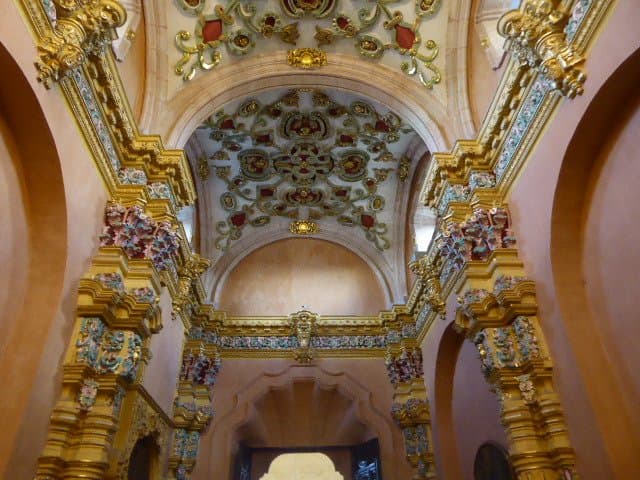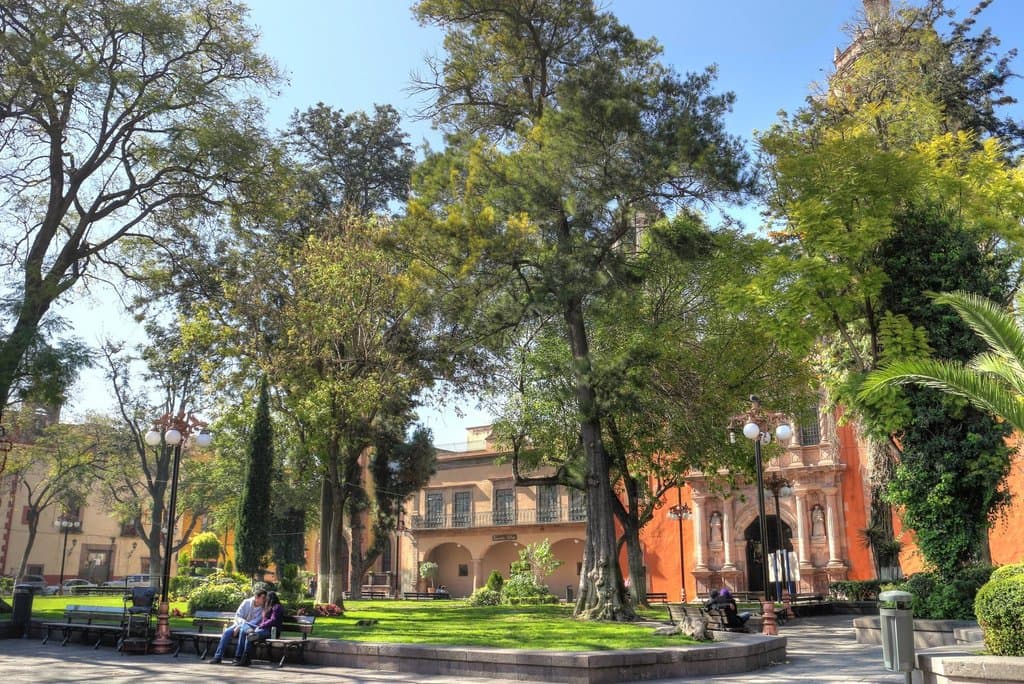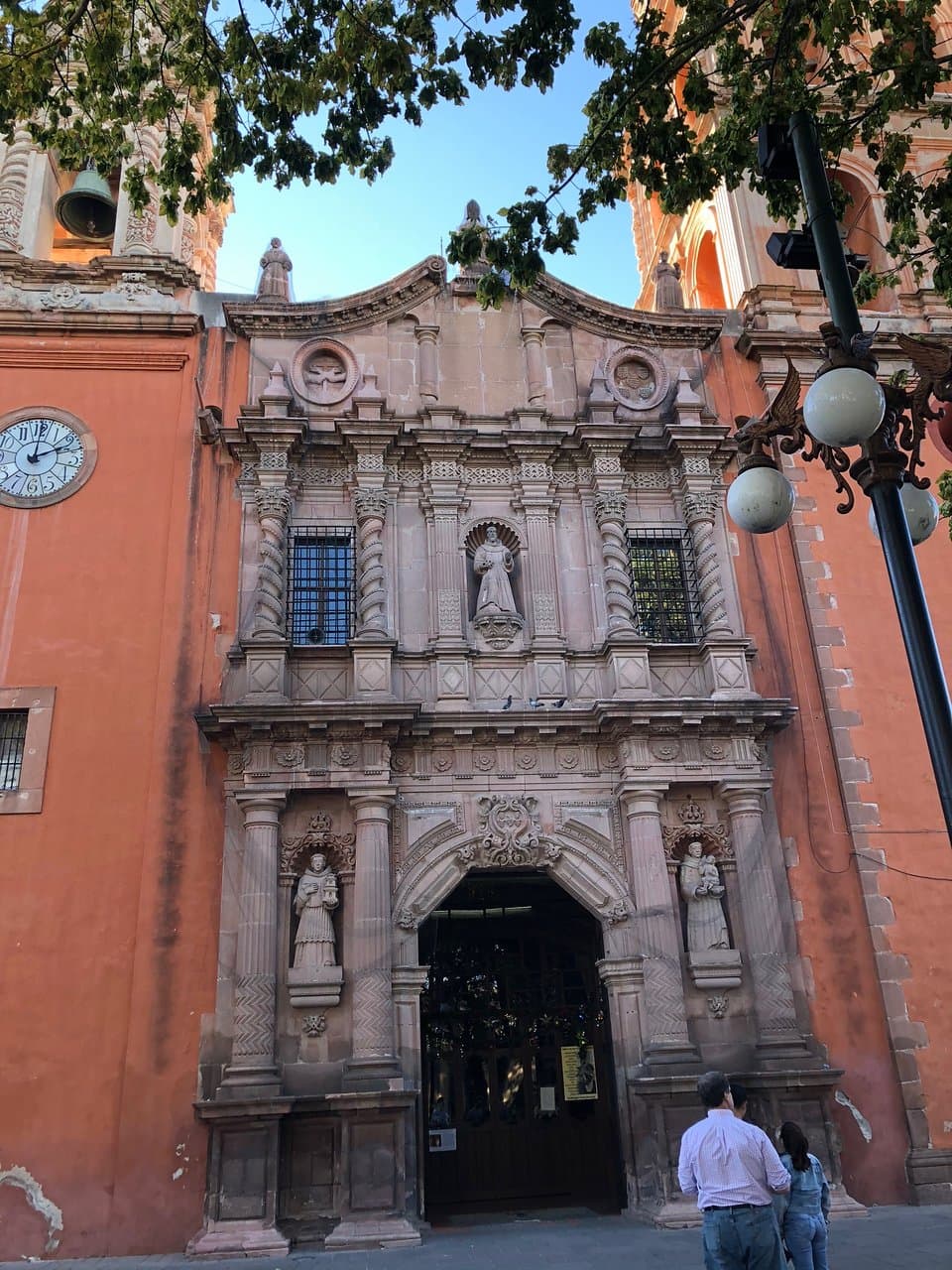
Templo de Nuestra Señora de Aranzazú
A stunning 18th-century Baroque chapel, once part of a Franciscan convent, now a jewel within the Potosino Regional Museum.

Highlights
Must-see attractions

Social
From TikTok & Reddit
Best Time
Fewer crowds, peaceful exploration

Templo de Nuestra Señora de Aranzazú
Best Time
Fewer crowds, peaceful exploration

Highlights
Must-see attractions
A stunning 18th-century Baroque chapel, once part of a Franciscan convent, now a jewel within the Potosino Regional Museum.
"A sort of hidden gem in the heart of San Luis Potosi City. Best Baroque you can find in Central Mexico."

🏛️ Museum Access
Entry to the temple is via the Potosino Regional Museum. Plan accordingly for museum hours.
✨ Architectural Gem
Don't miss the intricate Baroque details and monumental paintings inside.

Highlights
Discover the most iconic attractions and experiences

Baroque Architecture
Marvel at the exquisite 18th-century Baroque design, a testament to the craftsmanship of the Franciscan Order and Basque society.

Franciscan Convent Vestiges
Explore the remnants of the 16th-century Convent of San Francisco, offering a glimpse into the site's rich historical past.

Monumental Paintings & Altarpieces
Admire the impressive monumental paintings and intricately crafted altarpieces that adorn the temple's interior.
Plans like a pro.
Thinks like you
Planning Your Visit
A Baroque Masterpiece
Access and Integration
Best Times
Insider Tips
from TikTok, Instagram & Reddit
🏛️ Museum Access
Entry to the temple is via the Potosino Regional Museum. Plan accordingly for museum hours.
✨ Architectural Gem
Don't miss the intricate Baroque details and monumental paintings inside.
📍 Central Location
Easily accessible in downtown San Luis Potosí, near Plaza Aranzazú.
Tips
from all over the internet
🏛️ Museum Access
Entry to the temple is via the Potosino Regional Museum. Plan accordingly for museum hours.
✨ Architectural Gem
Don't miss the intricate Baroque details and monumental paintings inside.
📍 Central Location
Easily accessible in downtown San Luis Potosí, near Plaza Aranzazú.
What Travellers Say
Reviews Summary
Visitors praise the Templo de Nuestra Señora de Aranzazú as a hidden gem with stunning Baroque architecture, offering a glimpse into colonial history. Its integration with the Regional Museum enhances the experience, providing a rich blend of art and historical context. Some note that access is through the museum, requiring attention to its operating hours.
"A sort of hidden gem in the heart of San Luis Potosi City. Best Baroque you can find in Central Mexico. Easily accessible for free at the Regional Museum"
Ruben Mend
"Bella"
andres vazquez
"It belonged to the Convent of San Francisco, whose construction began in 1591. The chapel dates from the mid-18th century. The convent was partially destroyed during the Reform Laws, which stripped the Church of its assets. Galeana Street was opened and lots were sold on both sides of the street. The chapel is now part of the Potosino Regional Museum, which is accessed via Galeana Street and is very well preserved.
Inside the museum, you can see a model of the original floor plan of the Convent of San Francisco, as well as pieces of pre-Hispanic archaeology and colonial art, the old convent kitchen, and fragments of the original floor and painting."
Sara H
What People Like
What People Dislike
Frequently Asked Questions
🚇 🗺️ Getting There
The temple is located in the heart of San Luis Potosí City and is accessible via Galeana Street. It's integrated into the Potosino Regional Museum, so your entry point will be through the museum.
Yes, the temple is in a central downtown area, making it easily walkable from other attractions in San Luis Potosí.
From San Luis Potosí International Airport (SLP), you can take a taxi or a ride-sharing service directly to the Potosino Regional Museum. The journey typically takes around 30-40 minutes.
Yes, several local bus routes pass through the downtown area, with stops near the museum. Check local transit information for the most convenient routes.
Street parking can be limited in the downtown area. It's advisable to use nearby public parking lots or garages if you are driving.
🎫 🎫 Tickets & Entry
Entry to the temple is typically included with admission to the Potosino Regional Museum. It's best to check the museum's current admission fees and hours.
The temple's hours are generally aligned with the Potosino Regional Museum. It's recommended to verify the museum's operating hours before your visit.
While the temple itself is a historical site, access is usually granted through the museum. The museum typically has a modest entrance fee.
Yes, the temple is usually open on weekends as it's part of the museum. Weekend visits might be busier, so consider going earlier in the day.
While primarily a historical site within a museum, it's worth checking local listings for any special religious services or cultural events that might be held there.
🎫 🏛️ Onsite Experience
The temple is a prime example of Baroque architecture, specifically from the 18th century, showcasing elaborate ornamentation and dramatic design elements.
Inside, you'll find impressive monumental paintings, ornate altarpieces, and a beautifully inspired ceiling. You can also see fragments of original floor and painting.
Yes, the intricate details and grand scale make it a fantastic spot for photography. Be mindful of any restrictions within the museum.
To fully appreciate the temple and its integration with the museum, allocate at least 1-2 hours.
As it's part of a museum, accessibility can vary. It's advisable to contact the Potosino Regional Museum directly to inquire about specific accessibility features.
🍽️ 🍽️ Food & Dining
Absolutely! The area around Plaza Aranzazú and downtown San Luis Potosí is filled with dining options, from traditional Mexican eateries to cafes.
You can find a variety of local Potosino cuisine, as well as international options. Many places offer breakfast, lunch, and dinner.
Yes, look for smaller local restaurants or street food vendors in the downtown area for more affordable meals.
Generally, food and drinks are not permitted inside historical sites like temples or museum exhibits to preserve them.
Don't miss trying 'enchiladas potosinas,' 'zacahuil,' and local sweets. Many cafes offer delicious pastries and coffee.
📸 📸 Photography
Focus on the altarpieces, ceiling details, and monumental paintings. The interplay of light and shadow can create dramatic shots.
While generally allowed, some museums may have restrictions on flash photography or tripods. Always check signage or ask staff.
Morning light can be softer and less harsh, but the dramatic interior lighting might be best captured during museum operating hours.
Yes, the exterior, especially its integration with the museum, offers interesting photographic opportunities.
Use a wider aperture (lower f-number) to capture more light and a higher ISO if needed. A tripod can be helpful if permitted.
For Different Travelers
Tailored advice for your travel style
👨👩👧 Families with Kids
Tips for families: Plan your visit during less crowded times, perhaps weekday mornings, to allow children more space to explore. Engage them by pointing out interesting figures in the paintings or the grandeur of the altarpieces. Consider a scavenger hunt for specific architectural elements. Ensure you check the museum's policies on strollers and accessibility beforehand.
🏛️ History Buffs
Must-dos for history buffs: Study the model of the original convent floor plan, examine the fragments of original paintings and floors, and appreciate the surviving altarpieces. Consider researching the Basque society's role in its construction for a deeper understanding of the socio-economic context.
Deep Dives
In-depth insights and expert knowledge
The Architectural Splendor of Baroque
The temple's integration into the Potosino Regional Museum adds another layer to its historical significance. Originally part of the Convent of San Francisco, founded in 1591, the chapel stands as a testament to the enduring legacy of the Franciscan Order. The museum itself houses artifacts from the convent's history, including a model of its original layout, offering context to the chapel's place within a larger monastic complex. This fusion allows visitors to appreciate not just the architectural beauty but also the historical narrative of the site.
Key features to look for include the monumental paintings that adorn the walls and the impressive altarpieces that showcase detailed craftsmanship. The ceiling, often a focal point in Baroque churches, is also noted for its inspired design. Even for those not religiously inclined, the sheer scale and artistry involved in its construction are astonishing, prompting questions about the methods and dedication required to build such a structure centuries ago.
A Journey Through History: From Convent to Museum
During this period of upheaval, Galeana Street was opened, bisecting the convent grounds and leading to the sale of adjacent lands. The Aranzazú Chapel, built within the vestiges of the older convent in the mid-18th century, managed to survive these changes. Today, it forms an integral part of the Potosino Regional Museum, which preserves and displays pieces of pre-Hispanic archaeology and colonial art, alongside elements of the convent's past, such as its old kitchen and fragments of original structures.
Visiting the temple and museum offers a comprehensive historical experience. You can trace the evolution of the site from its monastic origins to its current status as a cultural heritage destination. The resilience of the structure, having withstood earthquakes and historical reforms, is remarkable. It stands as a tangible link to the viceroyalty era and the enduring presence of religious and artistic traditions in San Luis Potosí.



Social
from TikTok, Instagram & Reddit